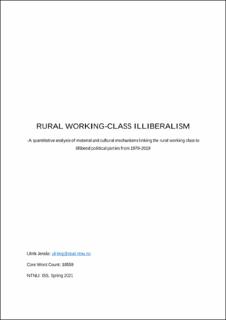| dc.contributor.advisor | Butcher, Charles | |
| dc.contributor.author | Jensås, Ulrik | |
| dc.date.accessioned | 2021-09-28T17:35:50Z | |
| dc.date.available | 2021-09-28T17:35:50Z | |
| dc.date.issued | 2021 | |
| dc.identifier | no.ntnu:inspera:80180343:25743178 | |
| dc.identifier.uri | https://hdl.handle.net/11250/2784620 | |
| dc.description.abstract | Denne oppgaven benytter se av data på parti- og landnivå for å analysere forholdene mellom illiberalisme i politiske partier og støtte fra den rurale arbeiderklassen. Teorigjennomgangen beskriver materielle og kulturelle mekanismer som forklarer den rurale arbeiderklassens støtte for slike partier, inklusivt materiall marginalisering og kulturell fremmedgjøring. Hypotesen om en sammenheng testes ved 6202 partier i perioden 1970-2019. Resultatene viser en signifikant og positiv korrelasjon, selv når alternative støttegrupper, regimetype, partiorganisering, økonomisk retorikk og politikk, og kulturell retorikk og politikk er kontrollert for. | |
| dc.description.abstract | This paper uses party- and national-level data to run a regression analysis which associates illiberalism in political parties to rural working-class support. The literary review describes both material and cultural mechanisms for rural working-class support of illiberal movements, including variants of material marginalisation and cultural alienation. The hypothesis is tested per 6202 electorally viable parties in the period 1970-2019. The results show a significant and positive correlation between the rural working class and illiberalism even when controlling for alternative support groups, regime qualities, party organisation forms, economic rhetoric and policies, and cultural rhetoric and policies. | |
| dc.language | eng | |
| dc.publisher | NTNU | |
| dc.title | Rural Working-Class Illiberalism | |
| dc.type | Master thesis | |
